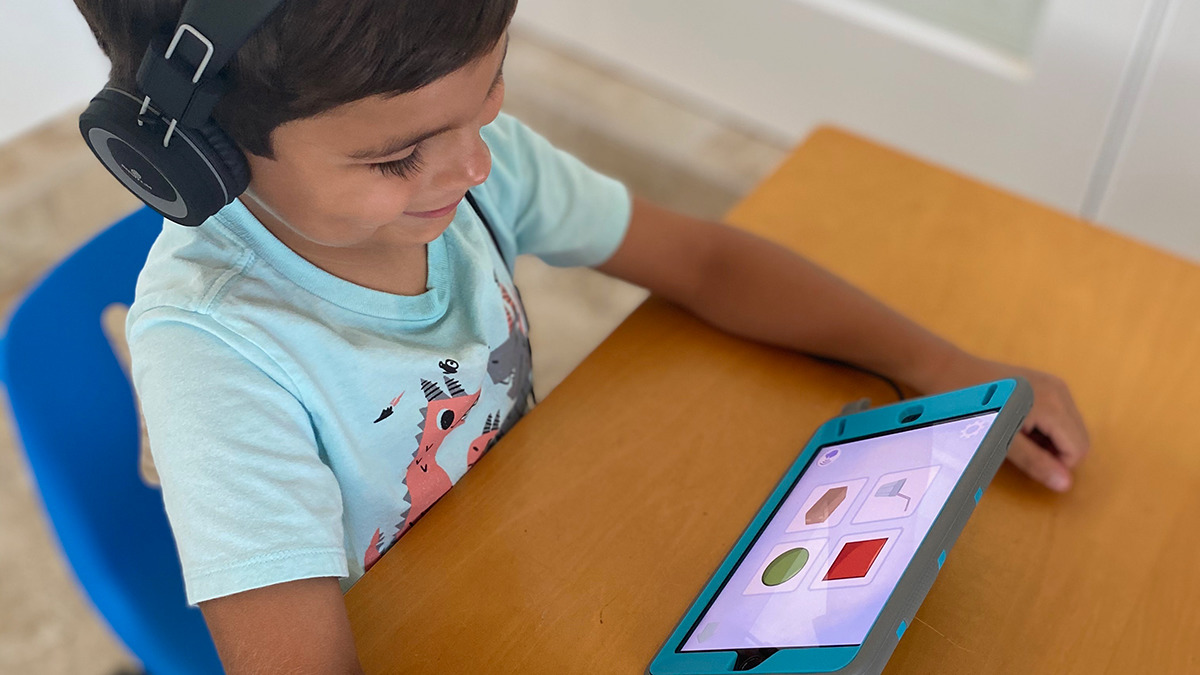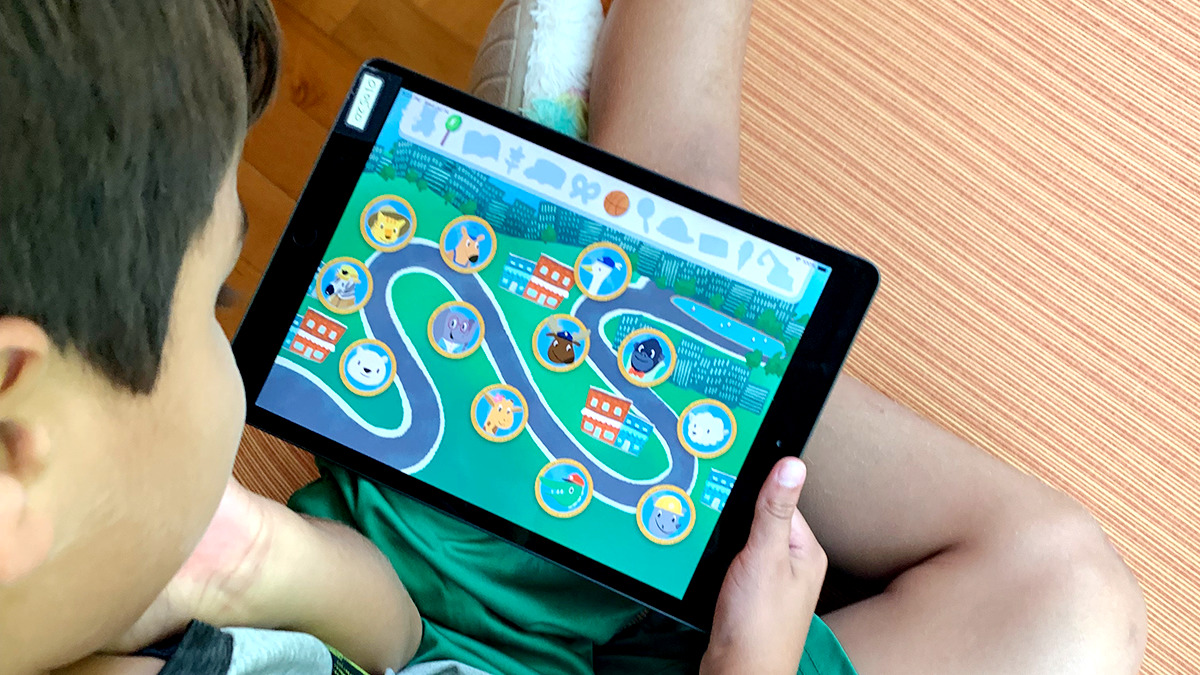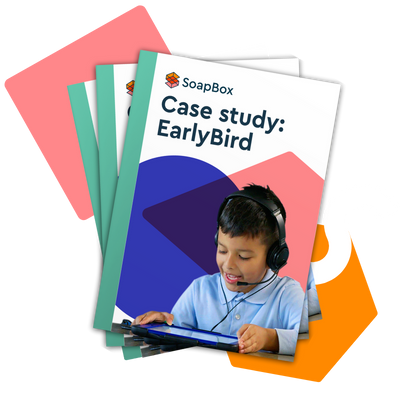10 questions on early literacy and speech tech
The SoapBox voice engine can power PreK-3 phonemic awareness activities. Here are the top FAQs on how our voice engine supports early literacy.

SoapBox client: EarlyBird Education
Product: EarlyBird
User group: Pre-K – 1st Grade
User count: 20,000+ students & 2,500+ teachers
Website: www.earlybirdeducation.com
EarlyBird’s mission is to change the learning trajectory of children by adopting a proactive and preventative approach to identifying dyslexia, and other reading challenges, at the earliest stages in a student’s reading journey. The platform is evidence-based and capitalizes on its solid research foundations to address the literacy milestones found to be predictive of reading success in young children.
Since the beginning of the 2021-22 school year, EarlyBird is being used in more than 100 school districts across 20 states in pre-K through first grade classes. The company has plans to expand its offerings to include second and third graders in the short-to-medium term.
Recognizing that educators lacked easy-to-administer, evidence-based tools for early identification of dyslexia risk in children, Dr. Nadine Gaab (Associate Professor at Harvard Graduate School of Education) spearheaded the development of EarlyBird’s platform at the Innovation and Digital Health Accelerator (IDHA) at Boston Children’s Hospital. EarlyBird co-founders include Dr. Yaacov Petscher from the Florida Center for Reading Research, and Carla Small, formerly Executive Director of IDHA and now EarlyBird CEO.
EarlyBird is a fun and engaging game that predicts a student’s risk for dyslexia and other reading challenges at the earliest stages, when the window for intervention is most effective. In the game, the child’s feathery friend Pip guides them along a path through the city, meeting animal friends who introduce the child to each subtest. The complete assessment takes 20 – 45 minutes depending on the child’s grade level and benchmarking period, and consists of a variety of subtests, including oral subtests that capture and score student responses. At the end of each 2- to 5-minute subtest, the child earns a virtual prize.
The oral subtests in the EarlyBird game are powered by speech recognition technology from SoapBox Labs, the leading speech tech company for kids. SoapBox’s technology generates accurate and automated scoring of student responses, surfacing the data on teacher dashboards in almost real time.
EarlyBird’s gamified assessment is self-administered in small groups and overseen by a caretaker or teacher who needs no specialized training. The test is adaptive, and thanks to SoapBox’s speech technology, scoring is largely automated.


Most “pencil and paper” diagnostic assessments identify a child’s decoding skills but fail to identify oral language skills. Based on word recognition only, the results of these assessments offer teachers limited insights about a child’s risk for dyslexia or other reading challenges.
EarlyBird’s founders knew that proficient reading requires both word recognition and language comprehension and decided to integrate speech technology into the platform to accommodate oral responses and ensure that teachers could easily identify where children were having, or were at risk of having, reading challenges.
The SoapBox voice engine works off-the-shelf, no custom coding needed, for a wide range of use cases including phonological awareness, phonics, pronunciation assessment, keyword spotting, words, phrases, and short sentences.
With our off-the-shelf voice engine, EarlyBird assesses students on all the critical skills foundational to reading, including: phonemic/phonological awareness, phonics, oral language comprehension, and naming speed (RAN).
Here’s how our voice engine integrates seamlessly into the EarlyBird experience: As a student moves along the gameboard, a robot holds out a microphone prompting them to speak. The SoapBox voice engine captures, analyzes, and automatically scores the student’s audio responses, which EarlyBird compiles into individualized student instructional profiles that, in near-real time, populate the teacher dashboard.
EarlyBird chose SoapBox over other speech engines because of our expertise when it comes to voice-enabling solutions for young children at the earliest stages of the literacy journey. The SoapBox engine is fit for purpose, quick to test, and easy to scale. Both companies also share a commitment to developing innovative edtech tools that are grounded in science and embrace evidence-based practices.
SoapBox supported EarlyBird through all stages of product development, testing, and launch of their platform with technology, UX, and product expertise. From the start, EarlyBird was impressed with the accuracy of SoapBox’s engine, which could capture the unique speech patterns of diverse early learner voices. Our focus on delivering a bias-free experience for every voice — regardless of race, background, accent, or ethnicity — was critical to EarlyBird and supports them in advancing culturally responsive practices in instruction and assessment.
Integrating SoapBox’s speech technology into the oral reading assessments of their gamified platform has allowed EarlyBird to:
We were looking for a partner equally committed to evidence-based product development and knew we could count on SoapBox Labs’ integrity of product, roots in science, and equity-focused design to accurately represent children’s voices of all accents and dialects.
Carla E. Small, CEO and Co-Founder of EarlyBird Education

Keep the case study in your back pocket. Here’s a downloadable version to share with your colleagues and access at your convenience.
The SoapBox voice engine can power PreK-3 phonemic awareness activities. Here are the top FAQs on how our voice engine supports early literacy.
This webinar introduces the features of our speech tech that spot, capture, and analyze a child’s short utterances, such a letter names and letter sounds.